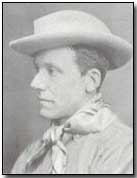Who's Who - Hesketh Hesketh-Prichard
 Major Hesketh Vernon
Hesketh-Prichard (1876-1922) played a notable role in organising effective
British sniping practices during the First World War.
Major Hesketh Vernon
Hesketh-Prichard (1876-1922) played a notable role in organising effective
British sniping practices during the First World War.
Hesketh-Prichard's background prior to war in 1914 was chiefly as a big-game hunter (and was regarded by some at the time as the world's best rifle shot), which as was often the case involved much travel.
He was also a keen cricketer and played for Hampshire as a fast bowler from 1899 until 1913, the year prior to war. Hesketh-Prichard periodically appeared in print with stories of his various travels, as well as producing works of fiction (Don Q being written in partnership with his mother, published in 1904 and filmed with Douglas Fairbanks Jr. in 1925).
Securing a commission in the British Army with the outbreak of war in Europe in 1914 Hesketh-Prichard was given the decidedly unusual post of 'sniping expert' to the British Third Army the following year, where he worked amicably and effectively with Sir Charles Monro, the Third Army commander.
Entering the Army with no illusions regarding the native British talent with regard to sniping Hesketh-Prichard immediately set about improving what he regarded as its deplorable standard. He initiated the inaugural sniper course entitled "The First Army School of Sniping, Observing and Scouting". As a measure of the lamentable condition of British sniping he subsequently wrote in Sniping in France:
"It is difficult now to give exact figures of our losses, suffice to say that in early 1915 we lost eighteen men in a single battalion in a single day to enemy snipers."
Under the static trench conditions of the Western Front the importance of effective sniping was greatly increased. Even during the hours of daylight, when activity on both sides was generally reduced, the ever-present menace of enemy snipers ensured that careless infantry who showed their heads above the trench firestep were immediately punished, often fatally.
Hesketh-Prichard proved inventive in attaining his aim of improving British sniping talent in the art of 'Hun Hunting', sourcing civilian rifles wherever possible, often funded from his own pocket and in spite of shortages of equipment, particularly optics.
Having attained his aim of boosting the presence and accuracy of British sniping (along with Major F. M. Grunt of the King's Royal Rifles) Hesketh-Prichard published his wartime memoirs, Sniping in France, in 1920. Two years later he was dead, killed by blood poisoning suffered during his wartime service. For his services he was awarded the MC and DSO.
A "blimp" was a word applied to an observation balloon.
- Did you know?
